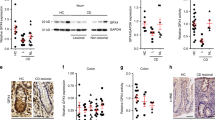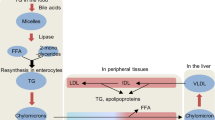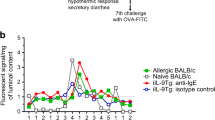Abstract
Intestinal inflammatory diseases are mediated by dysregulated immune responses to undefined luminal antigens. Feeding hen egg-white lysozyme to mice expressing a transgenic T-cell receptor that recognizes hen egg-white lysozyme peptide 46–61 resulted in no intestinal pathology; however, simultaneous administration of cyclooxygenase-2 inhibitors and dietary hen egg-white lysozyme resulted in increased proliferation of lamina propria mononuclear cells and crypt epithelial cells, crypt expansion and villus blunting. Lamina propria mononuclear cells produce high levels of cyclooxygenase-2-dependent arachidonic acid metabolites, which act as immunomodulators in the immune response to dietary antigen. These findings establish that cyclooxygenase-2-dependent arachidonic acid metabolites are essential in the development and maintenance of intestinal immune homeostasis.
This is a preview of subscription content, access via your institution
Access options
Subscribe to this journal
Receive 12 print issues and online access
$209.00 per year
only $17.42 per issue
Buy this article
- Purchase on Springer Link
- Instant access to full article PDF
Prices may be subject to local taxes which are calculated during checkout





Similar content being viewed by others
References
Strober, W. et al. Reciprocal IFN-gamma and TGF-beta responses regulate the occurrence of mucosal inflammation. Immunol. Today 18, 61–64 (1997).
Powrie, F. T cells in inflammatory bowel disease: protective and pathogenic roles. Immunity 3, 171–174 ( 1995).
Hurst, S.D., Sitterding, S.M., Ji, S. & Barrett, T.A. Functional differentiation of T cells in the intestine of T cell receptor transgenic mice. Proc. Natl. Acad. Sci. USA 94, 3920– 3925 (1997).
Schieferdecker, H.L., Ullrich, R., Hirseland, H. & Zeitz, M. T cell differentiation antigens on lymphocytes in the human intestinal lamina propria. J. Immunol. 149, 2816– 2822 (1992).
Braunstein, J., Qiao, L., Autschbach, F., Schurmann, G. & Meuer, S. T cells of the human intestinal lamina propria are high producers of interleukin-10. Gut 41, 215 –220 (1997).
Gonnella, P.A. et al. In situ immune response in gut-associated lymphoid tissue (GALT) following oral antigen in TCR-transgenic mice. J. Immunol. 160, 4708–4718 (1998).
Sher, A. et al. Role of T-cell derived cytokines in the downregulation of immune responses in parasitic and retroviral infection. Immunol. Rev. 127, 183–204 ( 1992).
Groux, H. et al. A CD4+ T-cell subset inhibits antigen-specific T-cell responses and prevents colitis. Nature 389, 737– 742 (1997).
Parronchi, P. et al. Type 1 T-helper cell predominance and interleukin-12 expression in the gut of patients with Crohn's disease. Am. J. Pathol. 150, 823–832 (1997).
Nilsen, E.M. et al. Gluten induces an intestinal cytokine response strongly dominated by interferon gamma in patients with celiac disease. Gastroenterology 115, 551–563 ( 1998).
Powrie, F. et al. Inhibition of Th1 responses prevents inflammatory bowel disease in scid mice reconstituted with CD45RBhi CD4+ T cells. Immunity 1, 553–562 ( 1994).
Davidson, N.J. et al. T helper cell 1-type CD4+ T cells, but not B cells, mediate colitis in interleukin 10-deficient mice. J. Exp. Med. 184, 241–251 (1996).
Mombaerts, P. et al. Mutations in T-cell antigen receptor genes alpha and beta block thymocyte development at different stages. Nature 360, 225–231 (1992).
Uematsu, Y. et al. In transgenic mice the introduced functional T cell receptor beta gene prevents expression of endogenous beta genes. Cell 52, 831–841 (1988).
Ho, W.Y., Cooke, M.P., Goodnow, C.C. & Davis, M.M. Resting and anergic B cells are defective in CD28-dependent costimulation of naive CD4+ T cells. J. Exp. Med. 179, 1539–1549 (1994).
Abbas, A.K., Murphy, K.M. & Sher, A. Functional diversity of helper T lymphocytes. Nature 383, 787–793 ( 1996).
Mombaerts, P. et al. Spontaneous development of inflammatory bowel disease in T cell receptor mutant mice. Cell 75, 274– 282 (1993).
Aabakken, L. & Osnes, M. Non-steroidal anti-inflammatory drug-induced disease in the distal ileum and large bowel. Scand. J. Gastroenterol. Suppl. 163, 48–55 ( 1989).
Bjarnason, I., Hayllar, J., MacPherson, A.J. & Russell, A.S. Side effects of nonsteroidal anti-inflammatory drugs on the small and large intestine in humans. Gastroenterology 104, 1832–1847 (1993).
Kaufmann, H.J. & Taubin, H.L. Nonsteroidal anti-inflammatory drugs activate quiescent inflammatory bowel disease. Ann. Intern. Med. 107, 513–516 (1987).
Demeure, C.E., Yang, L.P., Desjardins, C., Raynauld, P. & Delespesse, G. Prostaglandin E2 primes naive T cells for the production of anti- inflammatory cytokines. Eur. J. Immunol. 27, 3526–3531 (1997).
Betz, M. & Fox, B.S. Prostaglandin E2 inhibits production of Th1 lymphokines but not of Th2 lymphokines. J. Immunol. 146, 108–113 (1991).
Snijdewint, F.G., Kalinski, P., Wierenga, E.A., Bos, J.D. & Kapsenberg, M.L. Prostaglandin E2 differentially modulates cytokine secretion profiles of human T helper lymphocytes. J. Immunol. 150, 5321–5329 (1993).
Smith, W.L., Garavito, R.M. & DeWitt, D.L. Prostaglandin endoperoxide H synthases (cyclooxygenases)-1 and -2. J. Biol. Chem. 271, 33157– 33160 (1996).
Masferrer, J.L. et al. Selective inhibition of inducible cyclooxygenase 2 in vivo is antiinflammatory and nonulcerogenic. Proc. Natl. Acad. Sci. USA 91, 3228–3232 ( 1994).
Ellner, J.J. & Spagnuolo, P.J. Suppression of antigen and mitogen induced human T lymphocyte DNA synthesis by bacterial lipopolysaccharide: mediation by monocyte activation and production of prostaglandins. J. Immunol. 123, 2689–2695 (1979).
Gutgemann, I., Fahrer, A.M., Altman, J.D., Davis, M.M. & Chien, Y.H. Induction of rapid T cell activation and tolerance by systemic presentation of an orally administered antigen. Immunity 8, 667–673 (1998).
Snyder, D.S., Beller, D.I. & Unanue, E.R. Prostaglandins modulate macrophage Ia expression. Nature 299, 163–165 (1982).
Wu, C.Y., Wang, K., McDyer, J.F. & Seder, R.A. Prostaglandin E2 and dexamethasone inhibit IL-12 receptor expression and IL-12 responsiveness. J. Immunol. 161, 2723– 2730 (1998).
Kalinski, P., Hilkens, C.M., Snijders, A., Snijdewint, F.G. & Kapsenberg, M.L. IL-12-deficient dendritic cells, generated in the presence of prostaglandin E2, promote type 2 cytokine production in maturing human naive T helper cells. J. Immunol. 159, 28–35 (1997).
van der Pouw Kraan, T.C., Boeije, L.C., Smeenk, R.J., Wijdenes, J. & Aarden, L.A. Prostaglandin-E2 is a potent inhibitor of human interleukin 12 production. J. Exp. Med. 181 , 775–779 (1995).
Morham, S.G., Langenbach, R., Mahler, J. & Smithies, O. Characterization of prostaglandin H synthase 2 deficient mice and implications for mechanisms of NSAID action. Adv. Exp. Med. Biol. 407, 131–138 (1997).
Murphy, E. et al. Reversibility of T helper 1 and 2 populations is lost after long-term stimulation. J. Exp. Med. 183, 901–913 (1996).
Ziegler-Heitbrock, H.W., Frankenberger, M. & Wedel, A. Tolerance to lipopolysaccharide in human blood monocytes. Immunobiology 193, 217– 223 (1995).
Freudenberg, M.A. & Galanos, C. Induction of tolerance to lipopolysaccharide (LPS)-D-galactosamine lethality by pretreatment with LPS is mediated by macrophages. Infect. Immun. 56, 1352–1357 (1988).
Yamada, T. et al. Mechanisms of acute and chronic intestinal inflammation induced by indomethacin. Inflammation 17, 641– 662 (1993).
MacDonald, T.T. & Spencer, J. Evidence that activated mucosal T cells play a role in the pathogenesis of enteropathy in human small intestine. J. Exp. Med. 167, 1341–1349 (1988).
Ferreira, R.C. et al. Changes in the rate of crypt epithelial cell proliferation and mucosal morphology induced by a T-cell-mediated response in human small intestine. Gastroenterology 98, 1255– 1263 (1990).
Lionetti, P. et al. T-cell activation can induce either mucosal destruction or adaptation in cultured human fetal small intestine. Gastroenterology 105, 373–381 ( 1993).
Langenbach, R. et al. Prostaglandin synthase 1 gene disruption in mice reduces arachidonic acid-induced inflammation and indomethacin-induced gastric ulceration. Cell 83, 483–492 ( 1995).
Morham, S.G. et al. Prostaglandin synthase 2 gene disruption causes severe renal pathology in the mouse. Cell 83, 473– 482 (1995).
Futaki, N. et al. NS-398, a new anti-inflammatory agent, selectively inhibits prostaglandin G/H synthase/cyclooxygenase (COX-2) activity in vitro. Prostaglandins 47, 55– 59 (1994).
Moolenbeek, C. & Ruitenberg, E.J. The "Swiss roll": a simple technique for histological studies of the rodent intestine. Lab. Anim. 15, 57–59 (1981).
Cohn, S.M., Schloemann, S., Tessner, T., Seibert, K. & Stenson, W.F. Crypt stem cell survival in the mouse intestinal epithelium is regulated by prostaglandins synthesized through cyclooxygenase-1. J. Clin. Invest. 99, 1367 –1379 (1997).
Kruisbeek, A.M. in Current Protocols in Immunology (eds. Colligan, J.E., Kruisbeek, A.M., Margulies, D.H., Shevach, E.M. & Strober, S.) 3.1.2– 3.1.4 (John Wiley and Sons Inc, New York, 1997).
Acknowledgements
We thank J. McDonough for technical assistance; and K. Roth, E. Newberry and S. Amadeus for assistance with manuscript preparation. This work was supported by grants from the Charles E. Culpeper Foundation (R.G.L.), the American Digestive Health Foundation FFTA sponsored by Astra Merck (R.D.N.) and NIH grants DK-33165 and DK-55753 (W.F.S.). R.G.L. is a Charles E. Culpeper Foundation Scholar.
Author information
Authors and Affiliations
Corresponding author
Rights and permissions
About this article
Cite this article
Newberry, R., Stenson, W. & Lorenz, R. Cyclooxygenase-2-dependent arachidonic acid metabolites are essential modulators of the intestinal immune response to dietary antigen. Nat Med 5, 900–906 (1999). https://doi.org/10.1038/11341
Received:
Accepted:
Issue Date:
DOI: https://doi.org/10.1038/11341
This article is cited by
-
Evaluation of the effect of Punica granatum juice and punicalagin on NFκB modulation in inflammatory bowel disease
Molecular and Cellular Biochemistry (2016)
-
Lessons from rodent models in celiac disease
Mucosal Immunology (2015)
-
The Effect of Early Postoperative Non-Steroidal Anti-Inflammatory Drugs on Pancreatic Fistula Following Pancreaticoduodenectomy
Journal of Gastrointestinal Surgery (2015)
-
Targeted Drug Delivery to Intestinal Macrophages by Bioactive Nanovesicles Released from Grapefruit
Molecular Therapy (2014)
-
Cyclooxygenase-2 in mucosal DC mediates induction of regulatory T cells in the intestine through suppression of IL-4
Mucosal Immunology (2009)



